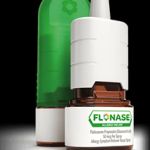Drug Class: Corticosteroid
Table of Contents
- Overview
- How to Take It
- Side Effects
- Warnings & Precautions
- Drug Interactions
- Dosage & Missing a Dose
- Storage
- Pregnancy or Nursing
- More Information
Overview
Flonase (Fluticasone) is a corticosteroid and is used to prevent allergy symptoms, including sneezing, itching, and runny or stuffed nose. It works by blocking the effects of substances that cause allergies in your nose. It also reduces swelling.
This medication is sometimes prescribed for other uses; ask your doctor or pharmacist for more information.
This information is for educational purposes only. Not every known side effect, adverse effect, or drug interaction is in this database. If you have questions about your medicines, talk to your health care provider.
How to Take It
Fluticasone comes as a solution to inhale through the nose. It is usually inhaled in each nostril once or twice a day. Follow the directions on your prescription label carefully, and ask your doctor or pharmacist to explain any part you do not understand. Use this medication exactly as directed. Do not use more or less of it or use it more often than prescribed by your doctor.
Fluticasone needs to be used regularly in order to work well. It may take several days for you to get the full benefit of the drug. You should use Fluticasone every day during the time when you usually have allergy symptoms. Call your doctor if your symptoms do not get better or get worse.
Before you use Fluticasone the first time, read the written instructions that come with it. Ask your doctor, pharmacist, or respiratory therapist to demonstrate the proper technique. Practice using the inhaler while in his or her presence.
Side Effects
Side effects that may occur while taking this medicine include:
- headache
- nasal irritation or dryness
- sore throat
- sneezing
- nausea
- nosebleed
- change in taste or smell
Contact your doctor immediately if you experience:
- difficulty breathing
- swelling of eyelids, face, or lips
- tingling of the hands or feet
- fever, chills or other flu-like symptoms
- skin rash or hives
- white spots in the mouth or nose
- increased thirst
- persistent sore throat
Warnings & Precautions
- Follow directions on product package or follow instructions as directed by your doctor. This medication should be used in the nose, usually once or twice a day. DO NOT spray this medication in your eyes.
- Inform your doctor if you are allergic to Fluticasone or if you have any other allergies.
- Stay away from people who are sick or have infections (e.g., measles, flu or chickenpox) that could spread. Call your doctor if think you were exposed to an infection.
- Tell your doctor your medical history, especially if you have experienced recent nasal problems, including ulcers, surgery or any type of injury), infections (e.g., tuberculosis, herpes eye infection), eye problems such as cataracts or glaucoma, or liver disease.
- Do not give Flonase to any child younger than four years old without consulting your doctor.
- For an overdose, seek medical attention immediately. For non emergencies, contact your local or regional poison control center at 1-800-222-1222.
Drug Interactions
HIV protease inhibitors, including lopinavir and ritonavir, may interact with this drug.
Before taking any new medicine, either prescription or over-the-counter, check with your doctor or pharmacist. This includes supplements and herbal products.
Dosage & Missed Dose
Use Flonase exactly as prescribed by your doctor and follow the prescription label carefully.
The usual dose of Fluticasone nasal is 1 to 2 sprays into each nostril once per day. If your symptoms improve, your doctor may change your dose.
The medicine bottle should be shaken well before each use.
Take your next dose as soon as you remember. If it is time for your next dose, skip the missed dose and go back to your regular schedule. Do not double doses or take extra medicine to make up for the missed dose.
Storage
Keep this medication in the container it came in, tightly closed, and out of reach of children. Store it at room temperature and away from excess heat and moisture (preferably not in the bathroom). Throw away any medication that is outdated or no longer needed.
Pregnancy/Nursing
This medication should be used only when clearly needed during pregnancy. Consult with your doctor to discuss the benefits and risks of using Flonase.
More Information
For more information, talk to your doctor, pharmacist or health care provider, or you can visit this website, https://www.flonase.com for additional information from the manufacturer of this drug.
